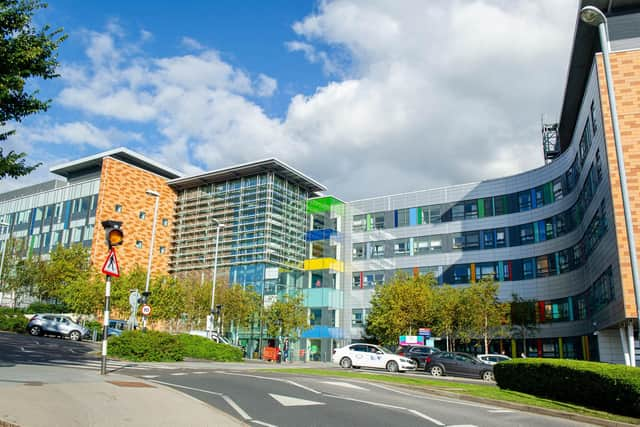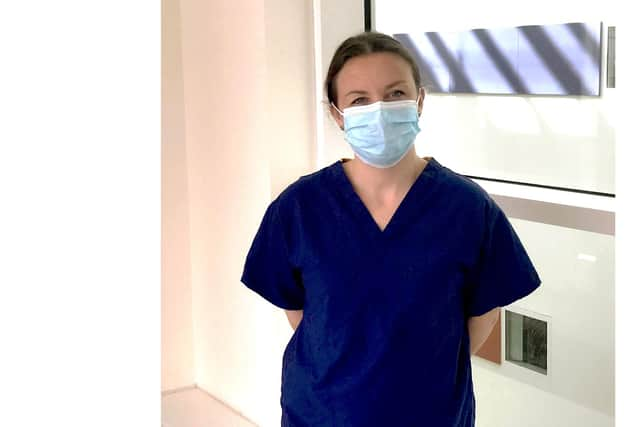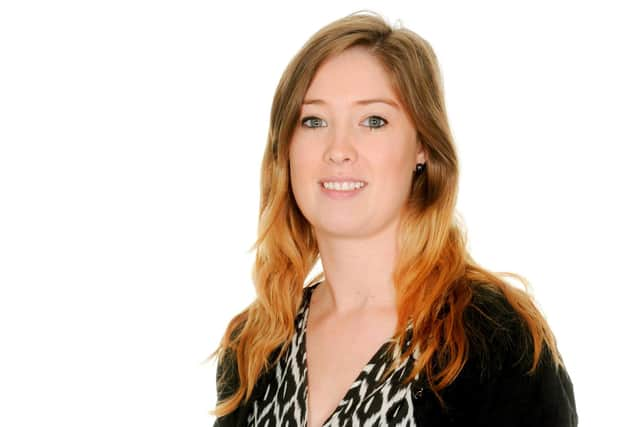Meet the staff and patients at Portsmouth's QA Hospital involved in 'vital' Covid trials
and live on Freeview channel 276
In the healthcare sector, departments and staff were pushed to the very limit caring for people of all ages suffering from the virus while maintaining other services where possible.
But through this difficult time, Queen Alexandra Hospital became one of the most proactive in the country, recruiting more than 3,600 patients for coronavirus studies over the last year as well as more than 5,000 for non-Covid trials.
Advertisement
Hide AdAdvertisement
Hide AdFor this Portsmouth Hospitals University NHS Trust (PHU) - which runs the hospital - was recognised as the top recruiting trust out of 42 other large acute trusts, with over 170 open studies.


And PHU was the eighth highest recruiting site for the REMAP CAP study nationally, using a novel trial design to evaluate a range of simultaneous treatment options for patients admitted to intensive care with acute Covid. Around 90 patients were involved in this.
So, in line with International Clinical Trials Day, which marks the anniversary of scurvy trials in 1747, The News spoke to some of the people involved.
Anoop Chauhan, executive director of research at PHU, said: ‘Clinical research in healthcare is vital in order to gain a greater understanding of diseases and viruses and how they behave. With this knowledge we can identify new and more effective methods of detection, diagnosis, treatment, and prevention— all of which benefit patients and help save many more lives.


Advertisement
Hide AdAdvertisement
Hide Ad‘The research and innovation team here at PHU have made an incredible contribution to a range of Covid-19 studies at a national level over the course of this past year, and I am delighted we are now leading on some really exciting, innovative and vital research using state of the art technology to identify and treat early signs of sepsis.
‘We continue to be incredibly grateful for the support and enthusiasm from our patients who volunteer and get involved in research to help identify the best treatments in the fight against Covid-19 and many other diseases to benefit others.’
Portsmouth mum-of-two Samantha Emmonds, who was seriously ill with Covid last year, recently took part in a Genomic study, which analyses the whole genome sequences of people who have been severely affected by coronavirus.
These genomes are then compared to those of people who only suffered mildly with Covid.


Advertisement
Hide AdAdvertisement
Hide AdSamantha, 45, was admitted to QA Hospital for five weeks and was placed in a medical coma for two.
With continued support from physiotherapy for her ongoing breathing difficulties, Samantha wanted to say thank you for the care she received at QA by volunteering to take part in the study post discharge.
Samantha said: ‘I was contacted by the research team soon after returning home and it was great to learn I could still participate in the study. They sent a kit to my home and then one of the research team visited and helped me with the process of donating my saliva for genetic sequencing.
‘I would be more than happy to get involved with research again, as I wouldn’t want anyone to suffer from Covid-19 and go through what I did. I have now been vaccinated which I cannot recommend more highly, it was so easy and straightforward – it’s better to be vaccinated than end up in hospital seriously ill.’


Advertisement
Hide AdAdvertisement
Hide AdHowever, it isn’t just patients who can get involved in research, colleagues at PHU are also encouraged to take part.
Currently 317 PHU staff members are recruited to the Siren study - which looks at whether prior infection with Covid-19 protects individuals against future re-infection.
Zoe Daly, research nurse at PHU, explained a bit more about why she got involved.
‘I chose to take part in the Siren study initially as I was interested in the benefit it would have personally, but also understood how important it would be to collect data to help answer a range of questions such as the infection rates amongst staff and whether people could be re-infected and if so, how often,’ she said.
Advertisement
Hide AdAdvertisement
Hide Ad‘The personal benefit from being involved in this study is the fortnightly reassurance that I am not an asymptomatic carrier. Before the availability of the lateral flow tests, I was really worried about working in the intensive care unit (ICU) and potentially taking Covid-19 home to my family.’


With 10 per cent of the research nurse workforce trained as ICU nurses, Zoe was redeployed to help support colleagues in ICU, looking after some of the sickest patients, while also continuing to carry out her research work where possible.
She added: ‘Due to the extensive research taking place, it was a real privilege to be able to offer new treatments to patients which could potentially be life-saving.
‘We received regular updates from the trial centres about all the effective treatments and fed this back to the clinical team, changing our practices to provide patients with the best possible outcomes to recover from Covid-19.’
Advertisement
Hide AdAdvertisement
Hide AdDegree research apprentice Erin James joined the research and innovation team in 2018.
Recently she has been working in the Portsmouth research vaccine hub.
She said: ‘This has been a really exciting and fast-paced area of research to be involved with, as it has focused on delivering Covid-19 vaccination research trials to the general public. I have also been leading a project which focuses on the PHU’s research and innovation department becoming a registered clinical trials unit which is an internationally recognised registry, and if successful, could significantly boost PHU’s research status and funding opportunities.’
Research trials manager at QA, Laura Marshall, believed research work is ‘essential’ in healthcare.
Advertisement
Hide AdAdvertisement
Hide AdShe said: ‘I have worked in the research department at Queen Alexandra Hospital for eight years. I initially started as a clinical trials assistant before progressing to my current role as a research trials manager. I manage a variety of locally (PHU) developed research studies and support the chief investigators and their research teams from the development stage right through to closing the study and sharing the results.
‘Research is essential in healthcare for developing new treatment methods, medications and changing clinical practice to enhance patient’s treatment and care. Being a trial manager and working within the research department is very rewarding as it plays a key role in this and I have a passion for making a difference.’
Toni Baker, research facilitator, added: ‘One of the highlights of my job is working with a wide range of teams and departments across the trust. Each team has their own style which makes supporting them fun and interesting. My role is really varied and often challenging as problem solving is required daily.
‘Working in the research department is a great way to get involved with a wide variety of clinical teams across the trust. If you are looking for a non-clinical role in healthcare that will challenge you every day then consider working in research and development.’
Advertisement
Hide AdAdvertisement
Hide AdVicky Sharples worked as a patient research ambassador during the pandemic.
‘It was great to take part in research myself and in May/June of last year I was invited to participate in the Welcome Trust’s national ‘Covid Living project’ which collected and recorded young people’s experiences during the crisis,’ she said.
‘The study was really fascinating and used smartphone technology to create diaries, record photos to describe our day, writing a journal and discussing our experiences with the researchers via WhatsApp, where they were really careful to build in the right safeguarding processes.’
The research team is currently involved in 10 public health studies.
Advertisement
Hide AdAdvertisement
Hide AdA total of 445 articles written by PHU staff were published in 2020/21
And 47 patients attending QA’s emergency department were recruited into the Falcon C-19 study to evaluate the accuracy of commercially available tests for diagnosing Covid-19 infection within hospitals.
A message from the Editor, Mark Waldron
You can subscribe here for unlimited access to our online coverage, including Pompey, for 27p a day.
Comment Guidelines
National World encourages reader discussion on our stories. User feedback, insights and back-and-forth exchanges add a rich layer of context to reporting. Please review our Community Guidelines before commenting.
